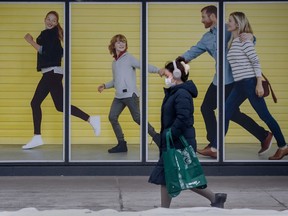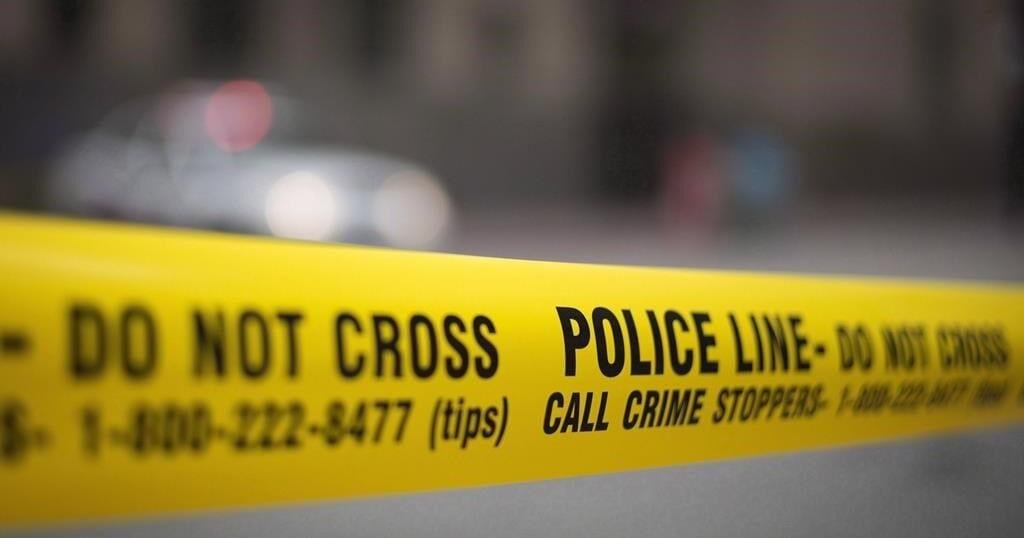Article content
Within hours of one another on Tuesday, Saskatchewan, P.E.I. and Alberta announced an imminent end to pandemic strictures, marking the first dominos to fall in what is poised to be a nationwide lifting of COVID-19 mandates.
Most provinces are actively questioning the utility of vaccine passports and other pandemic measures

Within hours of one another on Tuesday, Saskatchewan, P.E.I. and Alberta announced an imminent end to pandemic strictures, marking the first dominos to fall in what is poised to be a nationwide lifting of COVID-19 mandates.
As the Omicron wave subsides, most Canadians now live in a province whose health authorities are actively questioning the utility of vaccine passports and other pandemic measures.
Even in Quebec, authorities have dropped controversial plans for a tax on the unvaccinated, and are now announcing an end to “almost all” coronavirus restrictions by March 14 — although they will be hanging onto vaccine passports.
“We’re taking a calculated risk to learn to live with the virus,” Quebec Premier François Legault announced Tuesday.
Starting on Valentine’s Day, Saskatchewan is dropping all proof-of-vaccination requirements. In a statement, Premier Scott Moe said vaccine passports were an “effective policy, but its effectiveness has run its course.” He added, “The benefits no longer outweigh the costs.”
Prince Edward Island outlined plans to end most restrictions early in April, with Premier Dennis King cautioning that the loosening is not a declaration of victory. “COVID is still with us, and it will be with us,” he said.
Ontario has no definitive plans to end vaccine passports, but Chief Medical Officer of Health Kieran Moore said last week the province should “reassess the value” of the measure.
Manitoba is marking a light drawdown of COVID restrictions this week, such as the expansion of private gatherings. But authorities have hinted that if current trends continue, the province would be completely stricture-free by the spring.
“Later this spring we hope to be in a position of relaxing nearly all restrictions and moving to recommendations,” said Premier Heather Stefanson.


Canada looks to be repeating a trend that has already swept much of Europe.
In Spain, the U.K., Denmark and elsewhere, countries that were imposing harsh lockdowns just a few weeks ago are now openly declaring an end to the COVID-19 pandemic.
Before Christmas, Ireland was reacting to a spike in Omicron cases by imposing a slate of new pandemic lockdowns, including curfews on restaurants and bars. By the end of January, Irish Prime Minister Micheál Martin was announcing the effective end of the pandemic in Ireland with the message “we need to see each other again, we need to see each other smile, we need to sing again.”
Earlier this month, only weeks after it had been posting some of the world’s highest rates of COVID-19 infection, Denmark became the first country in Europe to universally lift COVID restrictions, crediting the country’s high vaccination rate with dramatically curbing the dangers of the virus. Notably, Danish Health Minister Magnus Heunicke has been an open critic of vaccine mandates.
“It’s a pharmaceutical intervention with possible side effects. You need as an authority to recognize that. I think if you push too much, you will have a reaction,” he recently told CNN.
It all marks an international shift towards recognizing COVID-19 as an “endemic” disease; a virus that is always somewhat present in a country’s population.
For Canada, the classic example of an endemic disease is influenza, a virus that reliably hospitalizes several thousand Canadians each year. Aside from seasonal vaccination campaigns that are largely voluntary, however, the disease has minimal effects on civic life.
On Jan. 21, British Columbia became the first province to declare that it would soon be treating COVID-19 no different than the flu. The novel coronavirus would henceforth be managed “much like how we manage other respiratory illnesses — influenza … or enteroviruses that cause the common cold,” Provincial Health Officer Bonnie Henry told a public briefing.
Last week, Chief Public Health Officer Theresa Tam was sounding the same tune, saying in a press conference that Canada needed to address COVID-19 in a “more sustainable way” and not be “in crisis mode all the time.”
“We do need to get back to some normalcy,” she said.
Canada’s abandonment of COVID restrictions is occurring against the background of nationwide blockades and protest convoys calling for the immediate end of COVID-19 restrictions. Since Jan. 29, large swaths of Ottawa have been shut down by a blockade of as many as 300 heavy vehicles refusing to leave until Canada has abandoned all masking, vaccination and quarantine mandates.
In dropping vaccine mandates, health authorities have been citing the fact that the measures no longer make sense in the face of the wildly infectious Omicron variant, which has proven to circulate among fully vaccinated people almost as well as among the unvaccinated (although the vaccines have been shown to protect against severe outcomes).
“When we see a vaccine that doesn’t provide the sterile immunity like it did provide against Delta, we have to reassess whether we maintain a proof of vaccination certification process, given the decreased benefit against transmission,” Ontario’s top doctor said last week.
The sheer transmissibility of Omicron has also left millions of Canadians with a post-infection natural immunity to the virus. While scientists don’t yet know how long that natural immunity may last, or how effective it may be against re-infection, Canada also has a vaccination rate that is one of the highest in the world.
In Alberta, Premier Jason Kenney has directly tied his province’s relaxation of COVID strictures to the ever-lightening burden on the province’s healthcare system. On Tuesday, he promised an end to “damaging restrictions” so long as “pressure on our hospitals continues to decline.”

Braxton Whitehead said Friday he has verbally committed to Arizona State, making him the first member of a Canadian Hockey League team to attempt to play the sport at the Division I U.S. college level since a lawsuit was filed challenging the NCAA’s longstanding ban on players it deems to be professionals.
Whitehead posted on social media he plans to play for the Sun Devils beginning in the 2025-26 season.
An Arizona State spokesperson said the school could not comment on verbal commitments, citing NCAA rules. A message left with the CHL was not immediately returned.
A class-action lawsuit filed Aug. 13 in U.S. District Court in Buffalo, New York, could change the landscape for players from the CHL’s Western Hockey League, Ontario Hockey League and Quebec Maritimes Junior Hockey League. NCAA bylaws consider them professional leagues and bar players from there from the college ranks.
Online court records show the NCAA has not made any response to the lawsuit since it was filed.
“We’re pleased that Arizona State has made this decision, and we’re hopeful that our case will result in many other Division I programs following suit and the NCAA eliminating its ban on CHL players,” Stephen Lagos, one of the lawyers who launched the lawsuit, told The Associated Press in an email.
The lawsuit was filed on behalf of Riley Masterson, of Fort Erie, Ontario, who lost his college eligibility two years ago when, at 16, he appeared in two exhibition games for the OHL’s Windsor Spitfires. And it lists 10 Division 1 hockey programs, which were selected to show they follow the NCAA’s bylaws in barring current or former CHL players.
CHL players receive a stipend of no more than $600 per month for living expenses, which is not considered as income for tax purposes. College players receive scholarships and now can earn money through endorsements and other use of their name, image and likeness (NIL).
The implications of the lawsuit could be far-reaching. If successful, the case could increase competition for college-age talent between North America’s two top producers of NHL draft-eligible players.
“I think that everyone involved in our coaches association is aware of some of the transformational changes that are occurring in collegiate athletics,” Forrest Karr, executive director of American Hockey Coaches Association and Minnesota-Duluth athletic director said last month. “And we are trying to be proactive and trying to learn what we can about those changes.
Karr was not immediately available for comment on Friday.
Earlier this year, Karr established two committees — one each overseeing men’s and women’s hockey — to respond to various questions on eligibility submitted to the group by the NCAA. The men’s committee was scheduled to go over its responses two weeks ago.
Former Minnesota coach and Central Collegiate Hockey Association commissioner Don Lucia said at the time that the lawsuit provides the opportunity for stakeholders to look at the situation.
“I don’t know if it would be necessarily settled through the courts or changes at the NCAA level, but I think the time is certainly fast approaching where some decisions will be made in the near future of what the eligibility will look like for a player that plays in the CHL and NCAA,” Lucia said.
Whitehead, a 20-year-old forward from Alaska who has developed into a point-a-game player, said he plans to play again this season with the Regina Pats of the Western Hockey League.
“The WHL has given me an incredible opportunity to develop as a player, and I couldn’t be more excited,” Whitehead posted on Instagram.
His addition is the latest boon for Arizona State hockey, a program that has blossomed in the desert far from traditional places like Massachusetts, Minnesota and Michigan since entering Division I in 2015. It has already produced NHL talent, including Seattle goaltender Joey Daccord and Josh Doan, the son of longtime Coyotes captain Shane Doan, who now plays for Utah after that team moved from the Phoenix area to Salt Lake City.
___
The Canadian Press. All rights reserved.

CALGARY – The Calgary Flames signed winger Jakob Pelletier to a one-year, two-way contract on Friday.
The contract has an average annual value of US$800,000.
Pelletier, a 23-year-old from Quebec City, split last season with the Flames and American Hockey League’s Calgary Wranglers.
He produced one goal and two assists in 13 games with the Flames.
Calgary drafted the five-foot-nine, 170-pound forward in the first round, 26th overall, of the 2019 NHL draft.
Pelletier has four goals and six assists in 37 career NHL games.
This report by The Canadian Press was first published Sept. 13, 2024.
The Canadian Press. All rights reserved.

A community legal clinic in Kingston, Ont., is denouncing the mayor’s calls to clear an encampment and close a supervised consumption site in the city following a series of alleged assaults that left two people dead and one seriously injured.
Kingston police said they were called to an encampment near a safe injection site on Thursday morning, where they allege a 47-year-old male suspect wielded an edged or blunt weapon and attacked three people. Police said he was arrested after officers negotiated with him for several hours.
The suspect is now facing two counts of second-degree murder and one count of attempted murder.
In a social media post, Kingston Mayor Bryan Paterson said he was “absolutely horrified” by the situation.
“We need to clear the encampment, close this safe injection site and the (Integrated Care Hub) until we can find a better way to support our most vulnerable residents,” he wrote.
The Kingston Community Legal Clinic called Paterson’s comments “premature and misguided” on Friday, arguing that such moves could lead to a rise in overdoses, fewer shelter beds and more homelessness.
In a phone interview, Paterson said the encampment was built around the Integrated Care Hub and safe injection site about three years ago. He said the encampment has created a “dangerous situation” in the area and has frequently been the site of fires, assaults and other public safety concerns.
“We have to find a way to be able to provide the services that people need, being empathetic and compassionate to those struggling with homelessness and mental health and addictions issues,” said Paterson, noting that the safe injection site and Integrated Care Hub are not operated by the city.
“But we cannot turn a blind eye to the very real public safety issues.”
When asked how encampment residents and people who use the services would be supported if the sites were closed, Paterson said the city would work with community partners to “find the best way forward” and introduce short-term and long-term changes.
Keeping the status quo “would be a terrible failure,” he argued.
John Done, executive director of the Kingston Community Legal Clinic, criticized the mayor’s comments and said many of the people residing in the encampment may be particularly vulnerable to overdoses and death. The safe injection site and Integrated Care Hub saves lives, he said.
Taking away those services, he said, would be “irresponsible.”
Done said the legal clinic represented several residents of the encampment when the City of Kingston made a court application last summer to clear the encampment. The court found such an injunction would be unconstitutional, he said.
Done added there’s “no reason” to attach blame while the investigation into Thursday’s attacks is ongoing. The two people who died have been identified as 38-year-old Taylor Wilkinson and 41-year-old John Hood.
“There isn’t going to be a quick, easy solution for the fact of homelessness, drug addictions in Kingston,” Done said. “So I would ask the mayor to do what he’s trained to do, which is to simply pause until we have more information.”
The concern surrounding the safe injection site in Kingston follows a recent shift in Ontario’s approach to the overdose crisis.
Last month, the province announced that it would close 10 supervised consumption sites because they’re too close to schools and daycares, and prohibit any new ones from opening as it moves to an abstinence-based treatment model.
This report by The Canadian Press was first published Sept. 13, 2024.
The Canadian Press. All rights reserved.


Dolphins will bring in another quarterback, while Tagovailoa deals with concussion


B.C. to scrap consumer carbon tax if federal government drops legal requirement: Eby


David Beckham among soccer dignitaries attending ex-England coach Sven-Goran Eriksson’s funeral


Vancouver Whitecaps cautious of lowly San Jose Earthquakes


A linebacker at West Virginia State is fatally shot on the eve of a game against his old school


Hall of Famer Joe Schmidt, who helped Detroit Lions win 2 NFL titles, dies at 92


Unifor says workers at Walmart warehouse in Mississauga, Ont., vote to join union


Alouettes receiver Philpot announces he’ll be out for the rest of season